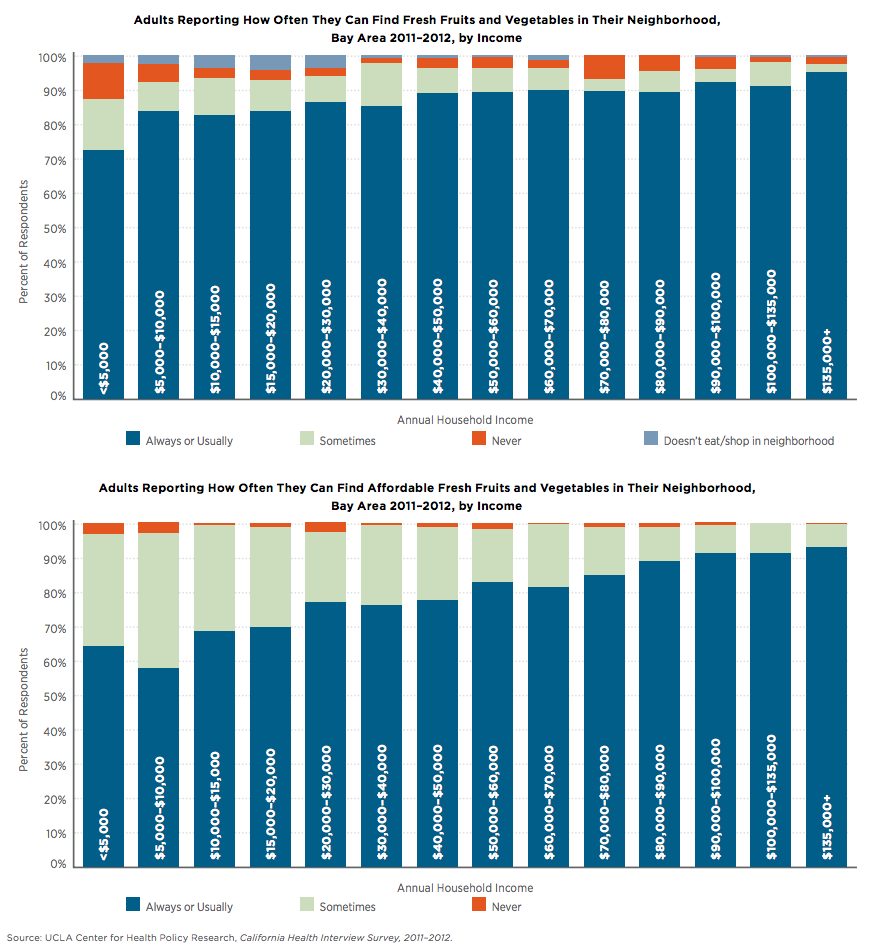Why Cities Should Pay People To Eat Their Veggies

Dallas Events Inc / Shutterstock.com
Federal and state governments are matching some food-stamps purchases at farmers markets dollar for dollar. When cities take advantage, it pays.
All the talk about "food deserts" dried up years ago. It turns out that truly barren concrete wastelands are harder to find than people figured. More recently, the conversation's turned toward "food swamps": places where food sources are abundant, but most of it's junk.
Focusing on food swamps and food deserts places the emphasis on a single policy point, which is physical access to healthy and affordable food. Physical proximity to food is a supply factor. Supply, however, doesn't drive consumer decision-making nearly as much as it might seem. Three other barriers to food access—economic, educational, and cultural barriers, all of them factors on thedemand side—also shape consumer behavior.
Changing demand factors may be a more direct way for cities to promote a sustainable healthy-food ecosystem. That's the overarching conclusion from arecent report on access to healthy and affordable food put out by the San Francisco Planning and Urban Research Association (SPUR). In light of the U.S. Department of Agriculture's announcement that it has awarded $31 million in municipal grants to make healthy foods more affordable for Supplement Nutrition Assistance Program (SNAP) participants, it appears that policymakers are indeed starting to tackle the demand side of the equation.
"You need to be addressing both supply and demand through policy to really make a dent in hunger, the issues of public health, and quality of life in terms of how far people have to travel to find healthy food," says Eli Zigas, the lead author of the SPUR report.
When cities address demand, they stand to make substantial gains themselves.

Charting access to fresh fruits and vegetables against access to affordable fresh fruits and vegetables reveals the disparity in demand for healthy foods. (SPUR)
Local governments can play a role in reducing demand for unhealthy foods and increasing demand for healthy foods. The USDA aims to do exactly that through its latest SNAP grants, $3.7 million of which will support the California Market Match program. This initiative matches SNAP purchases at farmers markets dollar for dollar (up to $10). So a person spending $10 in food-stamps benefits at a farmers market gets $20 in food, doubling the purchasing power of the benefit.
"The strongest lever that government policy has used in the past and should continue to use to influence demand is the economic lever," Zigas says. "Making sure that eligible residents have food assistance dollars that they qualify for is incredibly cost effective in terms of improving food access."
In San Francisco—the scope of the SPUR report—the budget for CalFresh(that's California's SNAP program) is $120 million. San Francisco kicks in $3.6 million in general funds; the rest is provided by state and federal governments. "For putting $4 million in, the city drew down another $117 million," Zigas says. "Another way to think about that is: For every dollar the city puts in, city residents get $25 to spend on food."
Focusing on the economic barriers to quality food access (again, a demand-side factor) over proximity to healthy food (supply) has many advantages. For example: The U.S. Centers for Disease Control and Prevention maintains maps that show the prevalence of healthy and unhealthy food options at the Census-tract level. This Modified Retail Food Environment Index maps the availability of healthy food within an area—a measure of Whole Foods versus fast food in a given neighborhood, if you will.
But the CDC tool doesn't account for affordability. Opening a farmers market in every red zone on a state map addresses potentially just one of the four barriers to healthy and affordable food access.
Meanwhile, on the demand side, the economic gains are both easier to track—and they're measured in dollars. San Francisco maintains that every $5 in CalFresh benefits spent generates $9 in economic activity. The $3.6 million the city has invested in CalFresh has paid off to the tune of $173 million in economic activity, according to the city's 2014 food security report.
Better still, San Francisco pays solely toward CalFresh administrative costs. The actual food benefits are paid for by state and federal assistance. "There's an economy of scale there," Zigal says. "San Francisco, recognizing this, hired more outreach workers [at the county CalFresh office] to find the people who would be eligible but have not yet signed up. They realize, this is money we're effectively leaving on the table."
The matching program works, in the Bay Area and beyond. "A two-year analysis of four different programs nationwide, including California's Market Match program—which operated at more than 150 markets in 2014—found that more than 75 percent of customers who used food stamps at farmers' markets reported increasing their produce purchases because of the incentive program."
The best news of all is also the worst news: California has some of the lowest SNAP participation rates in the nation. That means that there's a lot of room for improvement. In the Bay Area specifically, just 56 percent of residents eligible for CalFresh assistance received benefits in 2013, according to SPUR.
Given the level of federal and state assistance available, cities like San Francisco can't afford not to make sure residents get their SNAP benefits.





